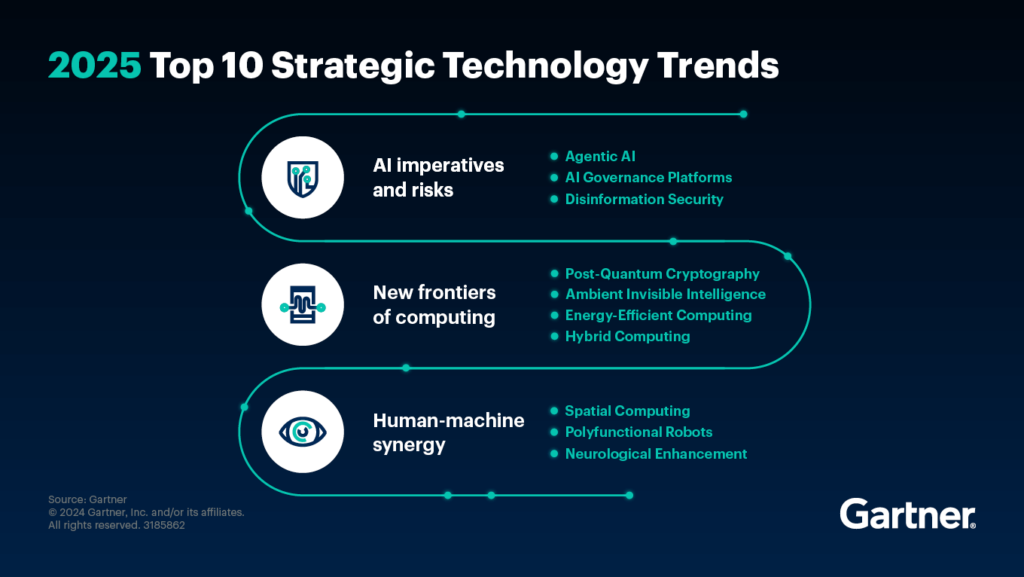The year 2025 will be a milestone in the evolution of information technologies, bringing challenges and opportunities that require immediate action.
Anticipating IT trends for 2025 is essential for positioning your company ahead of the competition.
As technological advances accelerate, companies and organizations must adapt to a constantly changing landscape. From the rise of Generative Artificial Intelligence to the consolidation of hybrid cloud computing architectures, these trends not only redefine operational paradigms but also create opportunities for innovation and sustainable growth.
Cybersecurity, driven by the growing threat of sophisticated attacks, and the automation of processes through AI are becoming increasingly essential.
As usual at the start of the year, in this article ActiveSys explores the main IT trends that will shape 2025, providing insights so that your organization is prepared to lead and innovate in an ever-evolving digital world.
According to Gartner, there will be 10 technological trends that will mark 2025:
1. Agentic AI: Refers to software programs designed to make decisions and take actions independently to achieve specific goals. These programs combine various AI techniques with features such as memory, planning, sensing the environment, using tools and complying with safety guidelines to perform tasks and achieve goals autonomously.
2. AI Governance Platforms: Help manage and control AI systems, ensuring that they are used responsibly and ethically. They allow IT leaders to make sure that AI is reliable, transparent, fair and accountable while complying with safety and ethical standards. This ensures that AI aligns with the organization’s values and wider social expectations.
3. Disinformation Security: Disinformation security is designed to help identify what is reliable. The aim is to create systems that guarantee the accuracy of information, verify authenticity, prevent impersonation and control the spread of harmful content.
4. Post-Quantum Cryptography: Post-Quantum Cryptography (PQC) refers to cryptographic methods designed to be secure against the potential threats posed by quantum computers.
5. Ambient Invisible Intelligence: Ambient invisible intelligence refers to the widespread use of small, low-cost tags and sensors to track the location and status of various objects and environments. This information is sent to the cloud for analysis and record-keeping. These technologies will be integrated into everyday objects, often without the user realizing it.
6. Energy Efficient Computing: Energy efficient computing refers to the design and operation of computers, data centers and other digital systems in such a way as to minimize energy consumption and carbon footprint.
7. Hybrid Computing: Hybrid computing combines various technologies – such as CPUs, GPUs, edge devices, ASICs and neuromorphic, quantum and photonic systems – to solve complex computational problems. It creates a hybrid environment that utilizes the strengths of each technology.
8. Spatial Computing: Spatial computing augments the physical world by ‘anchoring’ digital content in the real world, allowing users to interact with it in an immersive, realistic and intuitive experience.
9. Polyfunctional Robots: Polyfunctional robots are machines that can perform multiple tasks, following human instructions or examples. They are flexible in both design and operating modes.
10. Neurological Enhancement: Neurological enhancement is the process of improving a human being’s cognitive abilities using technologies that read and decode brain activity and, optionally, write to the brain.
These trends are not just predictions: they are tools for transforming your business and increasing your digital resilience.
To summarise, AI will continue to shape the technological landscape, but at the same time, it will bring some challenges.
Some of the more accessible generative models could be used to create sophisticated cyberattacks, such as personalized phishing and data manipulation.
On the other hand, and as a consequence, the labor market will bring new professions linked to ethics in AI, such as digital compliance specialists, who are essential for ensuring decisions are in line with regulations.
The new year promises to bring exciting advances and significant challenges for the technology sector. The secret to a successful year is a combination of innovation, collaboration and a resilient attitude.
Is your company ready to lead the digital transformation in 2025? Contact ActiveSys and build the digital future with us.
ActiveSys, we activate your business.

